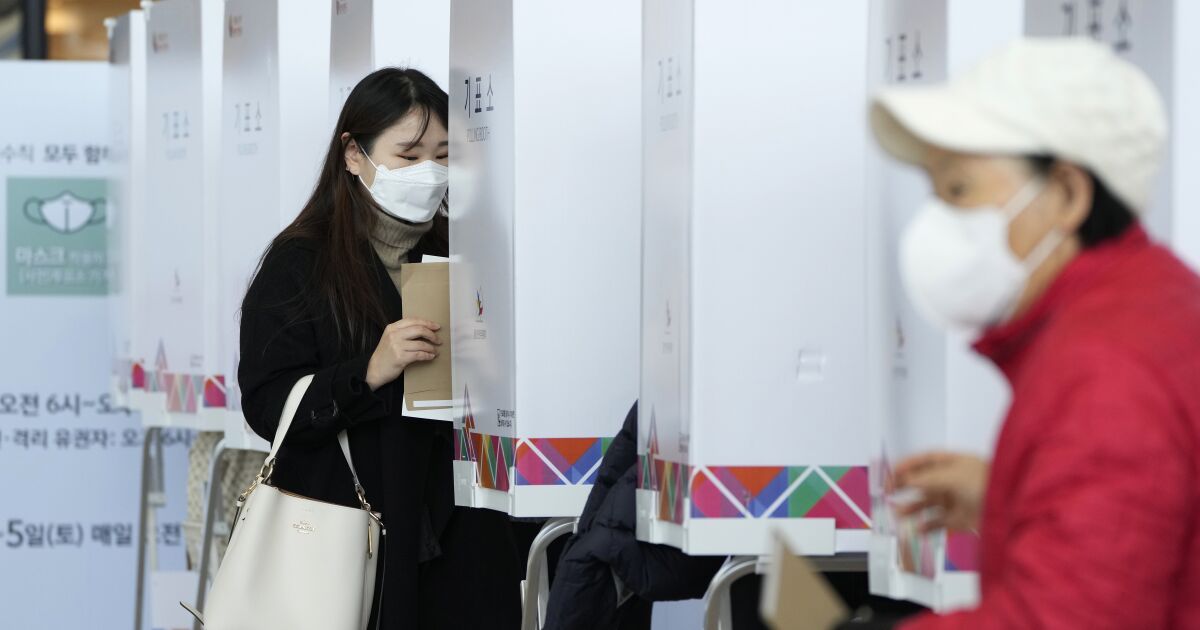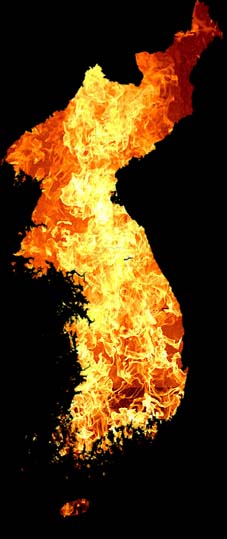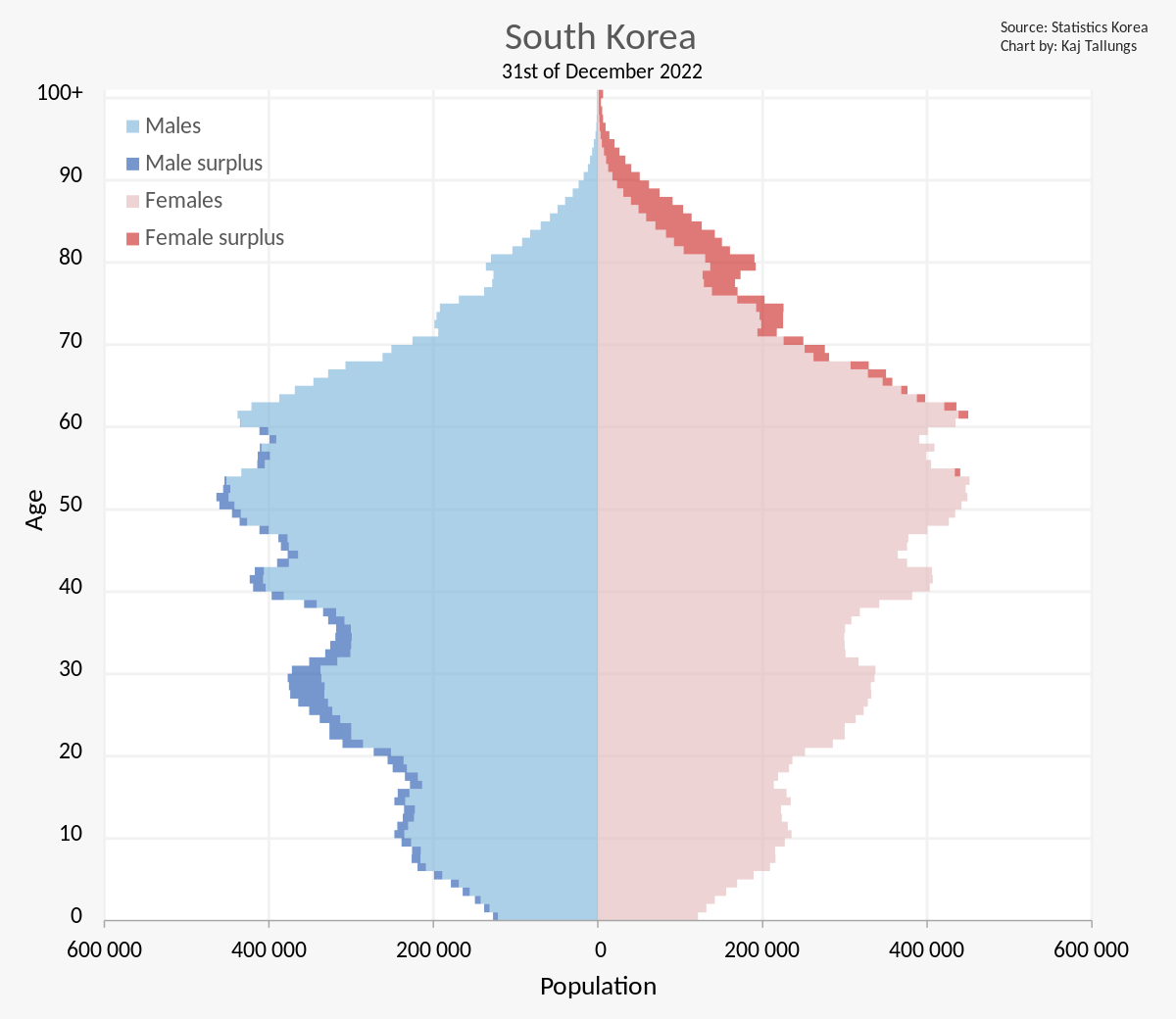jetfuelcel
Recruit
★★
- Joined
- Nov 23, 2018
- Posts
- 121
What do you think? There are obvious positives of living in the South, but I was surprised by digging into this topic at how much of a case one can make for the North - despite their labor camps, poverty, and totalitarianism.
https://en.wikipedia.org/wiki/List_of_countries_by_suicide_rate (all, male, female)
North Korea population: 26,072,217
Population density: 212/km^2
South Korea population: 51,966,948
Population density: 507/km^2

 theworld.org
There is one way in which North Korea’s elections are superior to those held in the United States. On voting day, North Koreans get the day off.
theworld.org
There is one way in which North Korea’s elections are superior to those held in the United States. On voting day, North Koreans get the day off.

 www.latimes.com
South Korea has "skyrocketing house prices."
www.latimes.com
South Korea has "skyrocketing house prices."

 en.wikipedia.org
In South Korea, many young people attend college because they believe they will have a difficult time finding employment without a college education. Reasons behind this include a strong organizational culture related to universities and academic institutions or hometowns. This organizational culture can be seen when interviewing to enter the workplace... People who are not from special schools are discriminated against and culled from the hiring process.
en.wikipedia.org
In South Korea, many young people attend college because they believe they will have a difficult time finding employment without a college education. Reasons behind this include a strong organizational culture related to universities and academic institutions or hometowns. This organizational culture can be seen when interviewing to enter the workplace... People who are not from special schools are discriminated against and culled from the hiring process.
The population density of Korea is 519 people/km^2. Seoul is very dense, at around 16,593 people/km^2. This level of population causes poverty for many as well, and contributes to competition for desirable jobs (such as those with job security or higher social perception) and living spaces. Some have abandoned their hopes for marriage and children (known as the Sampo generation) as they cannot afford to support a family, or wish to focus on their professional lives.
 en.wikipedia.org
Sampo generation is a neologism in South Korea referring to a generation that gives up courtship, marriage, and having kids. Many of the young generation in South Korea have given up those three things because of social pressures and economic problems, such as increasing cost-of-living, tuition payments, and affordable housing scarcity. There is also the opo sedae, or "five giving-up generation", which takes the same three and adds employment and home ownership. The chilpo sedae ("seven giving-up generation") further includes interpersonal relationships and hope, while the gupo sedae ("nine giving-up generation") extends to physical health and appearance. Finally, the sippo sedae ("ten giving-up generation") or wanpo sedae ("total giving-up generation") culminates in giving up life.
en.wikipedia.org
Sampo generation is a neologism in South Korea referring to a generation that gives up courtship, marriage, and having kids. Many of the young generation in South Korea have given up those three things because of social pressures and economic problems, such as increasing cost-of-living, tuition payments, and affordable housing scarcity. There is also the opo sedae, or "five giving-up generation", which takes the same three and adds employment and home ownership. The chilpo sedae ("seven giving-up generation") further includes interpersonal relationships and hope, while the gupo sedae ("nine giving-up generation") extends to physical health and appearance. Finally, the sippo sedae ("ten giving-up generation") or wanpo sedae ("total giving-up generation") culminates in giving up life.

 en.wikipedia.org
Analysts have attributed South Korea's population decline resulting from low birth rates to the country's high economic inequality; including the high cost of living, low wages for an OECD member country, lack of job opportunities, as well as rising housing in-affordability. Many South Koreans have termed their country "Hell Joseon" as a result, and the last two generations has considered themselves "Sampo" and "N-po" respectively. South Korea also has the highest suicide rate in the OECD and the wider developed world.
en.wikipedia.org
Analysts have attributed South Korea's population decline resulting from low birth rates to the country's high economic inequality; including the high cost of living, low wages for an OECD member country, lack of job opportunities, as well as rising housing in-affordability. Many South Koreans have termed their country "Hell Joseon" as a result, and the last two generations has considered themselves "Sampo" and "N-po" respectively. South Korea also has the highest suicide rate in the OECD and the wider developed world.
Among those working with or researching North Koreans’ resettlement in the South, though, his decision to return after barely a year marked the latest testament to the challenges North Korean refugees face adjusting to their new home, their isolation and economic difficulties furthered by the pandemic.
Nearly 1 in 5 North Korean refugees in South Korea said they have thought about going back, according to a 2021 survey by the nonprofit Database Center for North Korean Human Rights. The reason most often given is missing one’s hometown or family. Some said they experienced discrimination in South Korea or found the capitalist society too competitive, according to the survey.
The New Year’s jumper, who was about 30 and reportedly told investigators he’d been a gymnast in North Korea, worked as a janitor and struggled to make ends meet, according to local media reports.
The economic plight North Korean refugees can face was highlighted in 2019 when Han Sung-ok, a single mother, and her 6-year-old son were found dead in their Seoul apartment, possibly of starvation. The mother and son’s deaths became a rallying cry for fellow refugees. South Korea provides initial resettlement funds and housing for the first five years, but many are left with nothing once they’ve paid broker’s fees, and struggle to find stable jobs.
Jeon Su-mi, an attorney who works as an advocate for North Korean refugees, said many feel disillusioned by the individualism and capitalism of the South.
In Andrei Lankov's The Real North Korea:
"That said, the statistics are discouraging. In December 2010 research confirmed that the average income of a North Korean refugee in the South is merely 1.27 million won ($1,170), that is, roughly 50 percent of the average South Korean salary. Unemployment is high—depending on which of a few different studies you believe and how you define “unemployment,” it is estimated to be between 10 and 40 percent. Even the most optimistic estimates are depressing at best if one takes into account that South Korea has one of the lowest unemployment rates among countries in the developed world. Only 439 defectors (merely 4 percent of all employed defectors) were working in skilled jobs, while 77 percent were employed in unskilled jobs." (p. 98)
"Contrary to what is often assumed outside South Korea, [well-educated refugees] are not actively supported by the South Korean state, so one should not be much surprised by the sight of a former North Korean engineer who makes a living through pizza delivery..." (p. 230)
"[In the event of re-unification] nearly all North Koreans will soon discover that they are not eligible for anything but low-skilled, low-paid work. Some of them will manage to retrain themselves, but a majority will have to spend the rest of their life sweeping floors and working in sweatshops. They will see this as the result of discrimination. Indeed, as the bitter experience of North Korean refugees in the South demonstrates, some discrimination against the Northerners is almost certain to emerge. But to a large extent most of this so-called discrimination will reflect objective disadvantages of the North Korean workers who lack many modern skills." (p. 239)
"Unless something is done, the holders of pre-1946 land titles will descend on destitute North Korean villages, using litigation in order to take from North Korean farmers the only potentially valuable asset they have. Unfortunately (for North Korean farmers), the descendants of post-1946 migrants tend to be very successful and powerful in modern South Korea and therefore, if they decide to fight for 'their' property, have a chance of succeeding." (p. 241)
https://en.wikipedia.org/wiki/List_of_countries_by_suicide_rate (all, male, female)

| 8.2 | 10.6 | 6.3 |

| 21.2 | 29.7 | 13.4 |
North Korea population: 26,072,217
Population density: 212/km^2
South Korea population: 51,966,948
Population density: 507/km^2

How to 'vote' in North Korea
North Koreans get to “vote” this weekend. Here’s how their elections work.

What to know about South Korea's presidential election Wednesday
South Koreans vote Wednesday to choose their next president after a nasty campaign that has seen heavy mudslinging between the two leading candidates.

Hell Joseon - Wikipedia
The population density of Korea is 519 people/km^2. Seoul is very dense, at around 16,593 people/km^2. This level of population causes poverty for many as well, and contributes to competition for desirable jobs (such as those with job security or higher social perception) and living spaces. Some have abandoned their hopes for marriage and children (known as the Sampo generation) as they cannot afford to support a family, or wish to focus on their professional lives.
N-po generation - Wikipedia

Demographics of South Korea - Wikipedia
Among those working with or researching North Koreans’ resettlement in the South, though, his decision to return after barely a year marked the latest testament to the challenges North Korean refugees face adjusting to their new home, their isolation and economic difficulties furthered by the pandemic.
Nearly 1 in 5 North Korean refugees in South Korea said they have thought about going back, according to a 2021 survey by the nonprofit Database Center for North Korean Human Rights. The reason most often given is missing one’s hometown or family. Some said they experienced discrimination in South Korea or found the capitalist society too competitive, according to the survey.
The New Year’s jumper, who was about 30 and reportedly told investigators he’d been a gymnast in North Korea, worked as a janitor and struggled to make ends meet, according to local media reports.
The economic plight North Korean refugees can face was highlighted in 2019 when Han Sung-ok, a single mother, and her 6-year-old son were found dead in their Seoul apartment, possibly of starvation. The mother and son’s deaths became a rallying cry for fellow refugees. South Korea provides initial resettlement funds and housing for the first five years, but many are left with nothing once they’ve paid broker’s fees, and struggle to find stable jobs.
Jeon Su-mi, an attorney who works as an advocate for North Korean refugees, said many feel disillusioned by the individualism and capitalism of the South.
In Andrei Lankov's The Real North Korea:
"That said, the statistics are discouraging. In December 2010 research confirmed that the average income of a North Korean refugee in the South is merely 1.27 million won ($1,170), that is, roughly 50 percent of the average South Korean salary. Unemployment is high—depending on which of a few different studies you believe and how you define “unemployment,” it is estimated to be between 10 and 40 percent. Even the most optimistic estimates are depressing at best if one takes into account that South Korea has one of the lowest unemployment rates among countries in the developed world. Only 439 defectors (merely 4 percent of all employed defectors) were working in skilled jobs, while 77 percent were employed in unskilled jobs." (p. 98)
"Contrary to what is often assumed outside South Korea, [well-educated refugees] are not actively supported by the South Korean state, so one should not be much surprised by the sight of a former North Korean engineer who makes a living through pizza delivery..." (p. 230)
"[In the event of re-unification] nearly all North Koreans will soon discover that they are not eligible for anything but low-skilled, low-paid work. Some of them will manage to retrain themselves, but a majority will have to spend the rest of their life sweeping floors and working in sweatshops. They will see this as the result of discrimination. Indeed, as the bitter experience of North Korean refugees in the South demonstrates, some discrimination against the Northerners is almost certain to emerge. But to a large extent most of this so-called discrimination will reflect objective disadvantages of the North Korean workers who lack many modern skills." (p. 239)
"Unless something is done, the holders of pre-1946 land titles will descend on destitute North Korean villages, using litigation in order to take from North Korean farmers the only potentially valuable asset they have. Unfortunately (for North Korean farmers), the descendants of post-1946 migrants tend to be very successful and powerful in modern South Korea and therefore, if they decide to fight for 'their' property, have a chance of succeeding." (p. 241)





